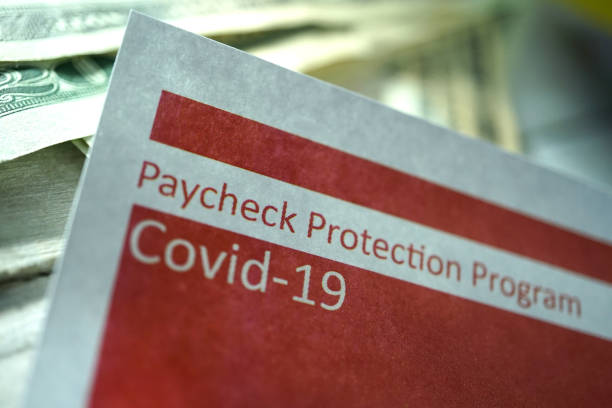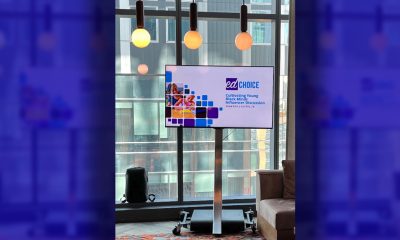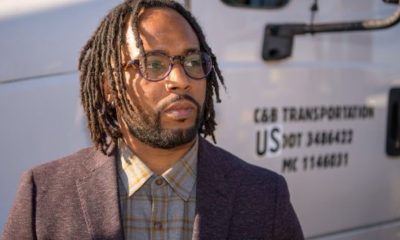Business
Latest U.S. Payroll Protection Program Can Help Minority-Owned Businesses
GTCF was launched by the Emmy award-winning GIVE TV creators Gary Reeves and acclaimed actor Blair Underwood to continue the philanthropic mission of this innovative television show currently appearing on Discovery Channel (OWN).

With the U.S. economy struggling through the impacts of the COVID-19, Congress passed a broad Coronavirus Relief Act that went into law at the end of 2020, which included $284billion in funding for a second round of the Paycheck Protection Program (PPP).
These funds are now being released, providing a lifeline to businesses, nonprofits, faith-based organizations and those who are self-employed, to get through these difficult economic times.
PPP, first introduced in 2020 as part of the CARES Act, provides businesses with “forgivable” loans, which will not have to be paid back if funds are used as outlined by the SBA to pay wages, rent, utilities, and other specified expenses.
Businesses can apply for a PPP loan, whether they received funds in the first round or not. And unlike traditional loans, qualifying for this program is not based on the borrower’s credit-worthiness, and there is no collateral or personal guarantee required. To qualify, businesses needed to have been operating before Feb. 15, 2020, and be within SBA PPP size guidelines. It is available to businesses that have employees and those that don’t, including independent contractors. It is also open to non-profit and faith-based organizations.
Many small businesses, especially minority/women-owned,did not take advantage of the PPP during the first round. It’s been well documented that minority-owned businesses, in particular, participated in PPP at a much lower rate than the rest of the country, and were often among the last to get PPP funds. This, despite the fact that African-American and Latino–owned businesses were among the hardest hit by the pandemic.
A lack of program awareness or misconceptions about eligibility were factors driving low participation. Limited access to banks offering PPP was another primary driver cited in a study conducted by the Brookings Institute, noting a reduction in community banks serving minority communities and a higher level of underbanked business owners.
This fact resonated with Damon Maletta, CEO of AdessoCapital, a business loan brokerage house, that has been helping businesses access capital since 2007. “During the first round, our existing clients approached us because they couldn’t find a bank that would take their application,” said Maletta. “Most banks were not equipped to process such high volumes of applications and didn’t have the capital, so they restricted applications to existing customers.”
Recognizing the significant impact of the COVID-19 Pandemic, the nonprofit “Give to Change” Foundation (GTCF) is quickly ramping up efforts to break down these barriers and help small businesses, nonprofits and faith-based organizations across all communities gain access to this program.
GTCF was launched by the Emmy award-winning GIVE TV creators Gary Reeves and acclaimed actor Blair Underwood to continue the philanthropic mission of this innovative television show currently appearing on Discovery Channel (OWN).
GTCF is partnering with Adesso Capital to help provide these organizations with streamlined program information, access to a leading SBA-Certified bank, a straight-forward online application, and a PPP helpline with experts who can help applicants with any program or application questions they may have.
This is all available to applicants at absolutely no cost, and accessible at www.giveppp.com. There you will find more details on program eligibility, how much money your business will qualify for, and program forgiveness.
A criticism of the PPP during the first round was that most of the funds went to large companies. Several changes made in this round, including reduction in the maximum loan amount from $10 million to $2 million, and a set-asides for minority-owned businesses will allow funding to go further and reach those that need it most.
However, funding is still limited and available on a first-come,first-serve basis and may be allocated before the program expires on 3/31/2020. Therefore, small business owners are encouraged to apply right away.
For PPP program details, online application, and access to the Give/Adesso PPP Helpline, go to www.giveppp.com.
Bay Area
State Controller Malia Cohen Keynote Speaker at S.F. Wealth Conference
California State Controller Malia Cohen delivered the keynote speech to over 50 business women at the Black Wealth Brunch held on March 28 at the War Memorial and Performing Arts Center at 301 Van Ness Ave. in San Francisco. The Enterprising Women Networking SF Chapter of the American Business Women’s Association (ABWA) hosted the Green Room event to launch its platform designed to close the racial wealth gap in Black and Brown communities.

By Carla Thomas
California State Controller Malia Cohen delivered the keynote speech to over 50 business women at the Black Wealth Brunch held on March 28 at the War Memorial and Performing Arts Center at 301 Van Ness Ave. in San Francisco.
The Enterprising Women Networking SF Chapter of the American Business Women’s Association (ABWA) hosted the Green Room event to launch its platform designed to close the racial wealth gap in Black and Brown communities.
“Our goal is to educate Black and Brown families in the masses about financial wellness, wealth building, and how to protect and preserve wealth,” said ABWA San Francisco Chapter President LaRonda Smith.
ABWA’s mission is to bring together businesswomen of diverse occupations and provide opportunities for them to help themselves and others grow personally and professionally through leadership, education, networking support, and national recognition.
“This day is about recognizing influential women, hearing from an accomplished woman as our keynote speaker and allowing women to come together as powerful people,” said ABWA SF Chapter Vice President Velma Landers.
More than 60 attendees dined on the culinary delights of Chef Sharon Lee of The Spot catering, which included a full soul food brunch of skewered shrimp, chicken, blackened salmon, and mac and cheese.
Cohen discussed the many economic disparities women and people of color face. From pay equity to financial literacy, Cohen shared not only statistics, but was excited about a new solution in motion which entailed partnering with Californians for Financial Education.
“I want everyone to reach their full potential,” she said. “Just a few weeks ago in Sacramento, I partnered with an organization, Californians for Financial Education.
“We gathered 990 signatures and submitted it to the [California] Secretary of State to get an initiative on the ballot that guarantees personal finance courses for every public school kid in the state of California.
“Every California student deserves an equal opportunity to learn about filing taxes, interest rates, budgets, and understanding the impact of credit scores. The way we begin to do that is to teach it,” Cohen said.
By equipping students with information, Cohen hopes to close the financial wealth gap, and give everyone an opportunity to reach their full financial potential. “They have to first be equipped with the information and education is the key. Then all we need are opportunities to step into spaces and places of power.”
Cohen went on to share that in her own upbringing, she was not guided on financial principles that could jump start her finances. “Communities of color don’t have the same information and I don’t know about you, but I did not grow up listening to my parents discussing their assets, their investments, and diversifying their portfolio. This is the kind of nomenclature and language we are trying to introduce to our future generations so we can pivot from a life of poverty so we can pivot away and never return to poverty.”
Cohen urged audience members to pass the initiative on the November 2024 ballot.
“When we come together as women, uplift women, and support women, we all win. By networking and learning together, we can continue to build generational wealth,” said Landers. “Passing a powerful initiative will ensure the next generation of California students will be empowered to make more informed financial decisions, decisions that will last them a lifetime.”
Business
Black Business Summit Focuses on Equity, Access and Data
The California African American Chamber of Commerce hosted its second annual “State of the California African American Economy Summit,” with the aim of bolstering Black economic influence through education and fellowship. Held Jan. 24 to Jan. 25 at the Westin Los Angeles Airport Hotel, the convention brought together some of the most influential Black business leaders, policy makers and economic thinkers in the state. The discussions focused on a wide range of economic topics pertinent to California’s African American business community, including policy, government contracts, and equity, and more.

By Solomon O. Smith, California Black Media
The California African American Chamber of Commerce hosted its second annual “State of the California African American Economy Summit,” with the aim of bolstering Black economic influence through education and fellowship.
Held Jan. 24 to Jan. 25 at the Westin Los Angeles Airport Hotel, the convention brought together some of the most influential Black business leaders, policy makers and economic thinkers in the state. The discussions focused on a wide range of economic topics pertinent to California’s African American business community, including policy, government contracts, and equity, and more.
Toks Omishakin, Secretary of the California State Transportation Agency (CALSTA) was a guest at the event. He told attendees about his department’s efforts to increase access for Black business owners.
“One thing I’m taking away from this for sure is we’re going to have to do a better job of connecting through your chambers of all these opportunities of billions of dollars that are coming down the pike. I’m honestly disappointed that people don’t know, so we’ll do better,” said Omishakin.
Lueathel Seawood, the president of the African American Chamber of Commerce of San Joaquin County, expressed frustration with obtaining federal contracts for small businesses, and completing the process. She observed that once a small business was certified as DBE, a Disadvantaged Business Enterprises, there was little help getting to the next step.
Omishakin admitted there is more work to be done to help them complete the process and include them in upcoming projects. However, the high-speed rail system expansion by the California High-Speed Rail Authority has set a goal of 30% participation from small businesses — only 10 percent is set aside for DBE.
The importance of Diversity, Equity and Inclusion (DEI) in economics was reinforced during the “State of the California Economy” talk led by author and economist Julianne Malveaux, and Anthony Asadullah Samad, Executive Director of the Mervyn Dymally African American Political and Economic Institute (MDAAPEI) at California State University, Dominguez Hills.
Assaults on DEI disproportionately affect women of color and Black women, according to Malveaux. When asked what role the loss of DEI might serve in economics, she suggested a more sinister purpose.
“The genesis of all this is anti-blackness. So, your question about how this fits into the economy is economic exclusion, that essentially has been promoted as public policy,” said Malveaux.
The most anticipated speaker at the event was Janice Bryant Howroyd known affectionately to her peers as “JBH.” She is one of the first Black women to run and own a multi-billion-dollar company. Her company ActOne Group, is one of the largest, and most recognized, hiring, staffing and human resources firms in the world. She is the author of “Acting Up” and has a profile on Forbes.
Chairman of the board of directors of the California African American Chamber of Commerce, Timothy Alan Simon, a lawyer and the first Black Appointments Secretary in the Office of the Governor of California, moderated. They discussed the state of Black entrepreneurship in the country and Howroyd gave advice to other business owners.
“We look to inspire and educate,” said Howroyd. “Inspiration is great but when I’ve got people’s attention, I want to teach them something.”
Activism
Oakland Post: Week of April 17 – 23, 2024
The printed Weekly Edition of the Oakland Post: Week of April 17 – 23, 2024

To enlarge your view of this issue, use the slider, magnifying glass icon or full page icon in the lower right corner of the browser window. ![]()
-

 Activism4 weeks ago
Activism4 weeks agoOakland Post: Week of March 27 – April 2, 2024
-

 #NNPA BlackPress4 weeks ago
#NNPA BlackPress4 weeks agoCOMMENTARY: D.C. Crime Bill Fails to Address Root Causes of Violence and Incarceration
-

 #NNPA BlackPress4 weeks ago
#NNPA BlackPress4 weeks agoMayor, City Council President React to May 31 Closing of Birmingham-Southern College
-

 #NNPA BlackPress4 weeks ago
#NNPA BlackPress4 weeks agoBeloved Actor and Activist Louis Cameron Gossett Jr. Dies at 87
-

 Community1 week ago
Community1 week agoFinancial Assistance Bill for Descendants of Enslaved Persons to Help Them Purchase, Own, or Maintain a Home
-

 Activism3 weeks ago
Activism3 weeks agoOakland Post: Week of April 3 – 6, 2024
-

 Business1 week ago
Business1 week agoV.P. Kamala Harris: Americans With Criminal Records Will Soon Be Eligible for SBA Loans
-

 Activism2 weeks ago
Activism2 weeks agoOakland Post: Week of April 10 – 16, 2024
























































